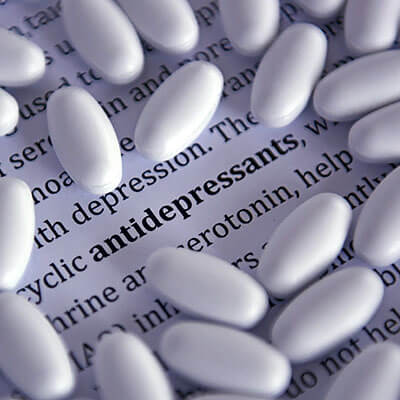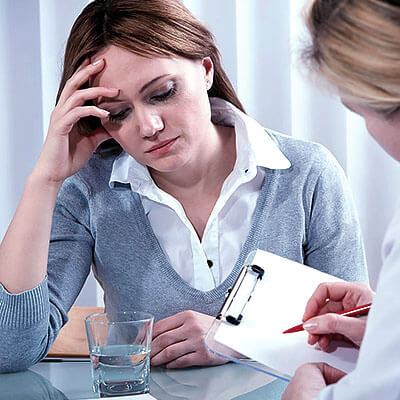What is Venlafaxine, and why should I take it?
Depression is an extremely common mental disorder today. Worldwide, it is estimated that 1 in 6 people suffer from it today, and the worst part is that they don't talk about it.
This disorder for not being detected or treated in time is responsible for taking the lives of thousands of people annually.
Clinically it is characterized by a change in mood towards one that is sad, unmotivated, and without interest in everyday life.
Although many confuse depression with sadness, depression is more than that. During the disease several biochemical changes make the brain inefficient, decreasing the levels of neurotransmitters necessary for normal functioning.
Yes, depression is considered an illness like any other, but in this case, the brain and its ability to produce chemicals are affected. And it needs proper diagnosis and timely treatment like any other disease.
There are many treatment options for depression, and it is known that therapy must involve several steps and family involvement. This includes psychological or psychiatric therapies, lifestyle changes, and taking medications. The fusion of these three elements will guarantee the success of the treatment.
Many people also use complementary practices that are nothing more than activities that reinforce lifestyle changes, such as yoga or acupuncture; however, this alone has not been shown to bring a big change in treatment.
Medicines used to treat depression are called antidepressants. In this section, we will talk about pharmacological treatment and Venlafaxine, one of its most emblematic drugs.
Patients can choose when it comes to drug treatment; these options can be classified into two large groups: classic antidepressants and last generation antidepressants.
Classic antidepressants get that name because they were the first to appear. Among them, we can find tricyclic antidepressants (TDA), such as Amitriptyline, Doxepin, Imipramine and Trimipramine, and monoamine oxidase inhibitors antidepressants (MAOI), such as Isocarboxazid, Phenelzine, Selegiline, and Tranylcypromine.
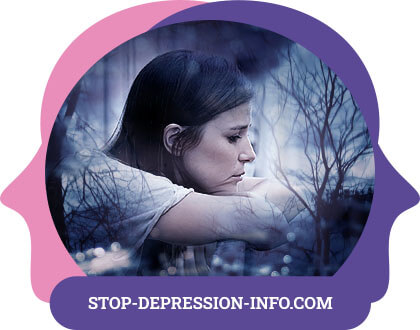
New and modified antidepressants are called next-generation antidepressants, with better therapeutic responses and fewer adverse effects. Many of them are included in this category, and their classification depends on how they work and what they do in our brain, that is, their mechanism of action (MOA).
We have those that inhibit the reuptake of serotonin, norepinephrine, dopamine, and agonists or antagonists of serotonin and melatonin receptors. We know it sounds a bit complicated, but all those names represent the most important elements in the genesis of depression, what we know as neurotransmitters.
Venlafaxine (Effexor®) is the latest generation antidepressant and anxiolytic that belongs to the group of serotonin and norepinephrine reuptake inhibitors (SNRIs) derived from phenylethylamine and chemically produced in the form of hydrochloride.
What is Effexor® for? Venlafaxine's therapeutic benefits are numerous thanks to its different cerebral effects; It is used both in depression, different presentations of anxiety to panic disorder.
How does Effexor® work in my brain?
We must first review brain functions and how our brain works daily to make us feel good to understand this segment. For a brain to function properly, it must generate adequate amounts of neurotransmitters daily.
These neurotransmitters are substances that are released between neurons to allow the transport of information, and there is a specific receptor for these substances in each neuron.
The brain amount of Serotonin, Norepinephrine, and Dopamine is decreased in a depressive person because their brain storage is increased. To reverse this decline, it is necessary to stop that storage by inhibiting its reuptake.
Then, Venlafaxine works by binding to those neuronal receptors to prevent the reuptake process from occurring, leaving Serotonin and Norepinephrine free between the neurons, increasing their quantities.
When the amount of Serotonin and Norepinephrine increases in the neuronal spaces, neurotransmission automatically increases.
Once Venlafaxine is ingested its availability in the body reaches 95%, after 2 to 4 hours maximum, and its consumption with food decreases its gastrointestinal absorption.
It seems untrue that a drug can help us improve our brain function, and not only this, Venlafaxine has the benefit that does not interact with important receptors such as heart muscarinic and histamine receptors. The opposite happens with classic antidepressants, they can produce arrhythmias, hypotension, and heart pattern changes.
Indications and contraindications: Can I take Venlafaxine?
Venlafaxine is used to treat disorders produced by an imbalance in the amounts of natural substances such as serotonin and norepinephrine.
Similar situations occur in generalized anxiety disorders (GAD), in social anxiety disorder (social phobia) in panic disorder, and all depressive disorders, including major depressive disorder and persistent depressive disorder (dysthymic).
Recent scientific advances have shown that Venlafaxine is also effective in neuropathic pain and can be safely indicated. Neuropathic pain is pain caused as a result of direct damage to nerves or any disease affecting the central or peripheral sensory system.
According to a 2016 investigation, Venlafaxine is useful in treating patients with systemic diseases causing nerve damage, such as diabetes mellitus, which appears to represent a progress in pain therapy.
Currently, more and more physicians around the world are including Venlafaxine as a medication for the relief of neuropathic pain.
The number of doses will depend on each patient, understanding that each person is a world and that each one has different needs. Our body does not work the same way, it is probable that certain people need small doses while others may need higher ones.
Venlafaxine also has contraindications like all medications. These include hypersensitivity to the drug itself, pregnancy, breastfeeding, and simultaneous treatment with other antidepressants such as MAO inhibitors.
If you were taking MAO inhibitors, you should stop their use and wait at least 14 days (2 weeks) before starting the Venlafaxine treatment.
Its use is also suspended in people with uncontrolled or undiagnosed heart disorders, such as uncontrolled and persistent high blood pressure.
It should be used with caution in older adults with kidney or liver problems since the metabolism of this drug is hepatic and its excretion route is renal.
Likewise, things are not black or white; Venfalaxine can be used in the above situations if the cardiac, renal, and hepatic function is monitored periodically.
There are special situations where the use of Venlafaxine may represent a risk but is not contraindicated. Among them are the risks of suicide, fractures, narrow-angle glaucoma, seizures, mania, and hypomania, risk of aggression, weight loss, bleeding, high cholesterol, drug abuse and dependence.
There are also important interactions with other drugs such as Ketoconazole, Imipramine, Cimetidine, Haloperidol, Ethanol (ethyl alcohol), Indinavir, Diazepam, Risperidone, Lithium, and Metoprolol.
All of the above does not mean that you will suffer any side effects from consuming this medication, what it really means is that its use should be monitored (as well as any medication) and indicated under the standards of a specialist. You can take Venlafaxine once the doctor is sure that you are a perfect candidate for it.
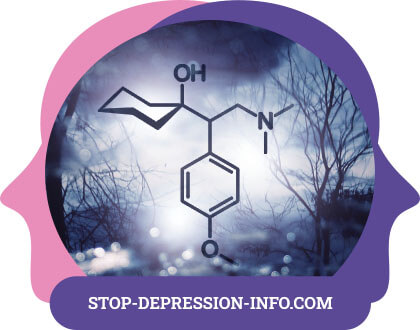
Side effects
Venlafaxine has side effects like all medications. In this particular, we will describe them by organs and systems.
Lymphatic system and blood: Few cases of agranulocytosis, anaplastic anemia, neutropenia, and pancytopenia have been described. All of these are changes in the formal elements of the blood.
Immune system: Anaphylactic type hypersensitivity reaction expressed as a severe allergy to the drug components.
Endocrine and metabolic system: Inappropriate production of antidiuretic hormone, modifying the urination rhythm. Salt imbalance (hyponatremia) and hunger changes (increased appetite or the opposite).
Nervous system: Unexplained fainting (syncope), convulsions, nervousness, apathy, excessive biting (bruxism), agitation, alterations in libido that can range from no orgasm to abnormal orgasm, sleep problems, unusual dreams, and headaches.
Ocular system: To date, only narrow-angle glaucoma, mydriasis, and ocular accommodation modifications have been described.
Cardiovascular system: High blood pressure or hypotension, postural hypotension, and suffocation sensation.
Respiratory system: Fatigue, shortness of breath, and lung disease affecting the interstitial.
Gastrointestinal system: Inflammation of the pancreas, blood loss, diarrhea, vomiting, nausea, dry mouth, difficulty passing stools (constipation).
Tegumentary system (skin and others): Edema, erythema, redness, swelling, rash, and hives, night sweats, hair loss, increased sensitivity to light, and Steven-Johnson syndrome.
Kidney system: Problems during urination such as urinary retention and urinary incontinence.
Other general problems: Fatigue, sleep, tiredness, chills, fractures without apparent origin.
Although the side effects are several, the common ones during the first weeks of treatment are:
- Drowsiness.
- Fatigue.
- Dizziness.
- Headache.
- Nightmares.
- Nausea and vomiting.
- Gastrointestinal problems.
- Appetite and weight loss.
Older adults may be more sensitive to side effects, most notably tiredness, dizziness, and drowsiness.
During pregnancy this medication should be used only if it is strictly necessary, since its safety has not been proven.
So if your trusted doctor selects you as a candidate to take Venlafaxine, you don't have to worry about side effects. Remember that these are the effects described so far; however, people do not suffer of them at the same time.
The number of side effects will decrease the more controlled the therapy is and the more evaluated a patient is. Always collaborate with your trusted doctor by complying with the tests that he or she indicates.
The satisfaction percentage of patients who have recently taken Venlafaxine is greater than 60%, according to 130 testimonials. Patients assure that it is a very effective drug and that if consumed with awareness and vigilance, its effectiveness increases to almost 100%.
Absorption, body distribution, and metabolism:
Venlafaxine travels through the entire digestive system until it is 92% intestinal absorbed once it is ingested. Then, it reaches its maximum concentrations in the bloodstream within 2 to 4 hours, with an average of 3 hours, depending on the type of presentation, whether it is of prolonged or immediate release.
Then, Venlafaxine enters the brain where it performs its function helping it to restore the balance of neurotransmitters within 3 days of starting the medication.
The metabolism is hepatic and begins after the previous step; it is given through the cytochrome P450 enzymatic system, the one used by all drugs. So, almost all drugs have interactions between them because they use the same metabolic step.
Finally, Venlafaxine and its degradation products are eliminated by the kidneys through the urine. This is why it is important the treatment monitoring in people with kidney disease because this drug has a renal step that can modify its amount in the blood if the kidneys do not work properly.
| Effexor XR mg/day | Placebo | |||||
|---|---|---|---|---|---|---|
| ≤ 75 | > 75 | |||||
| SSBP* | SDBP** | SSBP | SDBP | SSBP | SDBP | |
| Major Depressive Disorder | ||||||
| 8-12 weeks | -0.28 | 0.37 | 2.93 | 3.56 | -1.08 | -0.10 |
| Generalized Anxiety Disorder | ||||||
| 8 weeks | -0.28 | 0.02 | 2.40 | 1.68 | -1.26 | -0.92 |
| 6 months | 1.27 | -0.69 | 2.06 | 1.28 | -1.29 | -0.74 |
| Social Anxiety Disorder | ||||||
| 12 weeks | -0.29 | -1.26 | 1.18 | 1.34 | -1.96 | -1.22 |
| 6 months | -0.98 | -0.49 | 2.51 | 1.96 | -1.84 | -0.65 |
| Panic Disorder | ||||||
| 10-12 weeks | -1.15 | 0.97 | -0.36 | 0.16 | -1.29 | -0.99 |
| * Supine Systolic Blood Pressure; ** Supine Diastolic Blood Pressure | ||||||
Dosage and how to use Effexor® tablets:
Please, always read the medication guide before taking it and only follow the advice of your trusted physician. Don't be influenced by the opinions of non-specialists who don't know about your condition.
If you already take Venlafaxine remember that dosage is based on each medical condition.
In major depressive episodes, the recommended dose is 75 mg in the form of extended-release capsules.
It should be taken once a day with or without meals. In patients where no improvement has been seen with the 75 mg, it is recommended to increase the dosage up to 375 mg per day maximum.
The way to increase the dose is very methodical and should be done gradually for 2 weeks to decrease your risk of side effects and allow the body to get used to the new dose.
In social anxiety disorder is also commonly used the daily dose of 75 mg extended-release, and in cases where no improvement is seen, it can be progressively increased to 225mg per day whenever the doctor decides.
What should I do if I take more doses than prescribed?
If someone has overdosed you should immediately call a doctor or 911.
Symptoms that indicate overdose are dizziness, nausea, vomiting, numbness of the hands and feet, dilated pupils, feeling of intense cold or heat, drowsiness, seizures, increased or decreased heart rate, breathing problems, and coma.
What should I do if I miss a dose?
Take the tablet as soon as you remember the missed dose. If you remembered it near to the next dose, just take one tablet and continue your regular treatment. Do not double the dose to make up for the missed one, it can lead to side effects and overdose.
Storage:
Store the pills in a cool, dry room away from light, children, or pets.
Do not store the tablets in the bathroom, near the kitchen, or in the freezer. Storethese pills in a closet or on your nightstand.
Do not flush medications down the toilet or pour them down a drain. Dispose of this product properly after it has been used or when it is no longer needed.
Why choose Venlafaxine if I suffer from depression?
The recommendation of Venlafaxine is something that has been published in many systematic studies and clinical trials.
According to a clinical study called Effectiveness of the New Antidepressants Compared with Classic Serotonin Uptake Inhibitors where Venlafaxine was compared with Paroxetine, Fluoxetine, Sertraline, and Escitalopram, it was confirmed that the first one was more effective, and the response given was superior to Fluoxetine and Sertraline.
At the same time, another study conducted by the Psychiatry Service of the Hospital of Asturias highlighted that Venlafaxine, in addition to being more effective in postpartum and menopausal depression, is also resistant to hormonal changes when indicated at high doses.
Besides, it was proved in vitro that Venlafaxine does not have a carcinogenic capacity. It does not produce cancer or cellular mutations, which is why it is safe.
It has also been shown that adherence to treatment is greater when Venlafaxine is indicated as a first-choice therapy.
Sticking to treatment is a key part of recovery
Adherence to treatment is known as the patient's level of behavior toward taking the medication, following diets, and implementing new life habits as stipulated by the treating doctor. Adherence to treatment is closely related to the point of commitment and participation of the patient.
Antidepressant treatment is long term, both pharmacological and non-pharmacological, so it requires the maximum participation of the patient, and we cannot lie, sometimes it is not easy.
This treatment is divided into three phases: the acute phase, continuation, and recovery.
The first two phases can be the most difficult and where the symptoms are more evident. The goal is to avoid a relapse.
During these months you may feel pessimistic and sometimes believe that the medication is not useful; however, thanks to these two phases and the continuous taking of the medication is that we can reach the recovery phase.
The recovery phase is when you feel good and have no symptoms for at least six months. You must continue medication during this phase because, like the previous phase, there is a risk of relapse, which would lead us back to the acute phase.
During the entire treatment, it is necessary to combine the pills with therapy and change of life habits. The therapy will always be guided by a psyche specialist, such as a psychologist or psychiatrist and it can last from 6 months to years depending on what the specialist advises and the patient's commitment.
Lifestyle changes are necessary because even if they seem pointless, they help you adopt healthy habits daily. Exercising, practicing a sport, or performing some skill activity not only helps improve mood but also promotes the release of brain substances that end up increasing neurotransmission and eventually brain functions.
Physical activity is always an extra to the treatment because it increases confidence, generates distraction, facilitates social interactions, allows the release of stress and reduces anxiety, improves sleep schedules, balances the circadian rhythm, and provides an indescribable sense of well-being; also, it keeps us healthy and prevents many diseases.
Psychological/psychiatric therapy is not only a trusted escape for you, it also gives you the tools you need to solve simple or complex problems. You may not be able to find solutions to simple problems without help; sometimes depression can cloud your mind.
Attending therapy helps us to improve our inner speech, to reconstruct our thoughts and the way we understand things. It is an act of courage and kindness to our minds. We all need the help of a psychologist or psychiatrist at some point in our lives.
If you are diagnosed with depression think about the countless benefits of starting therapy early. In a condition like this, the sooner treatment is started, the better the reward is.
Don't think about it anymore, don't fill your mind with thoughts, go to your trusted doctor, and ask for help, start changing your life. You don't have to do everything at once; just by taking the first steps you can see a noticeable change in your life.
Not everything is lost, on the opposite; you are now starting a new journey towards inner knowledge that was previously an unknown path. Now you are going in the right direction, following who you are, and how important it is to accept and take care of ourselves to improve in life.
Articles
The true eyes of depression
Sometimes is normal to feel sad, helpless, and without motivation. One day you may wake up and feel like you don't want to go to work, and that's okay, one day you may not want to attend that party with your friends, and that's fine too. Accepting your feelings is important, as is learning to say ''no'' when we are not at our best.
That feeling of emptiness, sadness, and demotivation can take us by surprise and end all our plans; however, the constant tendency to change is what rules us during this journey called life, and just as we change cars or phones, we also change moods and feelings, so we should not feel guilty about it.
Things change course when that feeling of sadness becomes eternal and constant, affecting not only our daily performance but also our interpersonal relationships, our work and even taking us away from those we love the most; the family.
Depression is one of the most common mental disorders in the world. According to the WHO, by 2015 it was estimated that at least 300 million people in the world suffered from depression and that many times it was not a single condition, but could be linked to other mental disorders such as anxiety.
This mental illness has both professional and social consequences, with suicide being the most fatal, representing the failure of psychiatric treatment. The number of people with depression has been increasing in recent years, mainly in less developed countries where wages and quality of life are low, being these triggers for this disorder.
What is depression?
Depression is a common mental disorder that belongs to the depressive disorders group. Being depressed and having a diagnosis of depression means much more than being sad and feeling desolate, depression is known because the feeling of emptiness, unmotivated with little interest in activities lasts over time and does not disappear over the days, on the opposite, it gets worse.
It is estimated that depression affects one in six people in the world during their lifetime. Quite frequent, isn't it?
That is why it is time to be more empathetic when sharing with anyone since we do not know what internal struggles each one is fighting.
To speak of depression, this feeling of sadness and demotivation must remain for at least 2 weeks continuously, throughout the day. There are specific diagnostic standards for talking about depression and we will summarize them in parts:
Depression not only represents a single disorder or illness but is part of a group of illnesses named depressive disorders, which include particular types.
Types of depression:
The common ones are:
Major depressive disorder: It is called a major depressive disorder when sadness, the feeling of emptiness, lack of motivation, and a loss of interest in activities interfere with sleep, starvation, work, and social relationships for more than two weeks. It can also be known as a severe depressive disorder; this one makes a person unable to carry out any activity during the day.
A person with major depressive disorder suffers from severe symptoms, which usually do not allow him or her to make any activity. Who suffers from the major depressive disorder will likely do it once in their life, that is, that the person suffers only one severe episode in their entire life, however, it is also likely to reappear throughout life. The truth is that everything depends on the heterogeneity of each person.
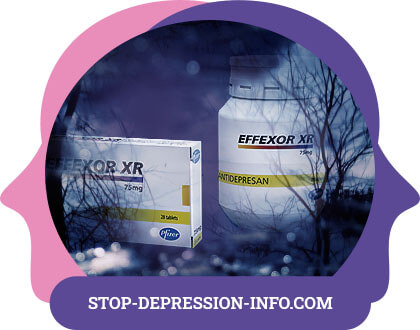
Persistent depressive disorder (dysthymic): Unlike the previous one, dysthymic disorder is well known by mild symptoms, which do not indisposed day-to-day life, but persist over time up to two years or more.
Dysthymic disorder symptoms are not disabling. They can make the person feel uncomfortable for many days or may not feel interested in certain activities, although, in the end, they end up doing them.
There are also other types of depression linked to other disorders or triggers, such as psychotic depression and postpartum depression, which although they relate the two previously mentioned, have qualities that differentiate them.
Postpartum depression: This appears in women who have recently had a baby and experience an episode of severe depression during the first month after giving birth. It is expected that 15% and 20% of women suffer from postpartum depression after giving birth, according to international numbers.
Psychotic depression: This is a bit more complicated than the last one because, in addition to the symptoms of depression, the person experiences psychosis. Psychosis is defined as episodes in which the patient loses touch with reality and manifests with delusions, hallucinations, incoherent speech, and behavioral changes.
Although this type of depression is extensively described, it is uncommon.
Who is at risk for depression?
This condition does not usually discriminate between race, gender, or age since it is known worldwide that it affects people of any nature and age, but of course, some risk factors can increase the chance of suffering a depressive episode such as:
- Unemployment
- The divorce
- Poverty
- The death of a loved one
- Breakup of a romantic relationship
- Problems with substances such as drugs and alcohol use
When we refer to risk factors we mean that they are possible triggers of depressive episodes, but not causes of depression.
What Causes Depression?
We cannot lie, the process is complicated, and it is based on three fundamental elements; biology, genetics, and the social environment.
A person likely suffers from depression when these three elements are put together unfavorably with a genetic predisposition.
Biology: It has been shown in multiple studies and clinical trials that the levels of the neurotransmitters that promote happiness such as serotonin, norepinephrine, or dopamine are decreased in depression and that certain hormonal changes also coexist.
Genetics: Hundreds of scientists have investigated the genes involved in the depression genesis for years. A recently published work by the American Journal of Psychiatry determines that 18 candidate genes are possibly involved, however, to date, the real relationship between the genes and depression has not been identified by this team.
Other studies have highlighted that the risk of suffering from depression increases among first-degree families, that is, between parents and siblings. This risk can increase by 50% compared to the general population.
Social environment: It is also well known that depressive episodes are often frequent when the above elements are linked with an unfavorable psychosocial environment. As we mentioned above, stress, the loss of a dream job, failing in a project, or the death of a loved one, can be triggers for the first depressive episode.
The first thing you should do is acknowledge what you are feeling and ask for help as soon as possible. You do not have to face depression alone, remember that you will always have incredible people around you to count on, always ask for help.
- Talk to someone you trust about what you feel, do not be afraid, you do not have to be ashamed of it. You can talk to your partner, best friend, your family, or anyone you consider proper.
- Consult with a doctor or specialist in the field. The earlier you go to a specialist, the greater the reward and the faster you will feel better. Depression, like any other disease, must be caught in time; also, the specialist is the one to find the key points and the one who can give you the best therapeutic advice.
- If you have thoughts of harming yourself or suicidal ideas, talk immediately to a professional or call the emergency number 911. Remember that your thoughts do not define you, nor do they define your life, they are only thoughts.
- Educate yourself. Knowing about depression is a key point in treatment to handle this condition in a better way.
- When we educate ourselves we can differentiate between what is real or not. It is also important to teach those around us about how we feel. Depression is right now an increasingly well-known and well-understood condition.
- If health professionals decide so, start drug treatment as soon as possible. Drugs are not only a fundamental part of treatment, but they also give your brain a boost to produce the necessary substances for it to work optimally.
- Improve your lifestyle. Exercising, doing activities that we enjoy, changing our eating habits, and controlling what we consume on social media are steps that, although they seem silly, are very important and play a key part in the treatment. Do not leave for tomorrow the baby steps you can achieve today.
Treatment options:
Treatment for depression is made up of different parts, from therapy and self-help to medications and family support. The first step that makes a difference will always depend on being aware of who we are and what we own, remembering that this condition does not define us as a person, but rather a part that goes with us as human beings.
After knowing ourselves, we must proceed with medical and psychological contact, which is essential for treatment success. Complying with therapy sessions and taking medications (if indicated) will contribute significantly to the way we see life.
Treatment is based on three principles:
- Psychological or psychiatric therapy
- Drug therapy
- Lifestyle changes
Psychological therapies will be guided by a health professional in the field of mental conditions; these will depend on the specialist preference according to their professional criteria and can range from cognitive-behavioral therapies, interpersonal therapies to family therapies. Family support will always add important weight to treatment.
Drug therapy: The main medications are antidepressants. These important drugs are responsible for helping brain systems to produce and increase reduced levels of neurotransmitters during a depressive episode.
How do they work?
Through complex biochemical reactions that increase brain activity to modify the release and storage of key elements in the genesis of depression such as serotonin, norepinephrine, and dopamine.
How Long Should I Take Depression Medication?
It depends on how severe each person's symptoms are. They are generally not indicated for more than 6 months, but it may be longer in certain cases, especially in severe ones where there is resistance to the drug.
You must always consult with your doctor about possible side effects before taking any pill. Read about the medication you are going to take and ask your doctor any pertinent questions. The more you know about what you are going to take, the safer you will be when taking it.
And as we said above, changes in lifestyle habits also go a long way toward improving depression symptoms and reducing future relapses.
Implementing sleep hygiene techniques, reducing the coffee consumption, practicing a sport or any activity that generates a certain degree of pleasure; be it music, drawing, art, or dance, as well as meditating or practicing yoga, are recommendations that, although they seem insignificant, make a big change in life perception and in the way of facing this situation. It is not necessary to do all these activities in one day, but taking small steps daily helps and when you realize it, you will be involved in a better lifestyle for your mental health.
Remember to consult a specialist if you suspect that you suffer from depression. The key to improving our lives is to act immediately when we need help. The specialists are there, the family is there, the friends, teachers, siblings and partner are there, just waiting for you to talk to listen to you.
By: Alexandra Dimant




